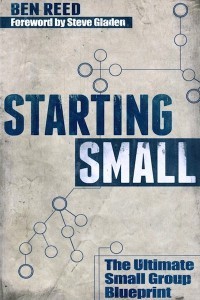The Importance of Groups in the Church: An Interview with Ben Reed
 Ben Reed is the small groups pastor at Long Hollow Baptist Church in Hendersonville, Tennessee. He is considered one of the leading authorities in the nation on the vital role of groups in the church. Ben’s recent book, Starting Small: The Ultimate Small Group Blueprint, has just been released. It is currently available as an ebook, and will soon be released as a print book as well.
Ben Reed is the small groups pastor at Long Hollow Baptist Church in Hendersonville, Tennessee. He is considered one of the leading authorities in the nation on the vital role of groups in the church. Ben’s recent book, Starting Small: The Ultimate Small Group Blueprint, has just been released. It is currently available as an ebook, and will soon be released as a print book as well.
I am delighted Ben took time for this interview. I believe the issue of groups in the church will be one of the most vital discussions of the next decade. Ben Reed will be at the forefront of that discussion.
If a casual observer were to ask you: “Why should I have groups in my church?”, how would you respond?
Because “groups” aren’t just a church growth strategy. They’re not just the latest innovation. They’re not just something “cool” to do. They’re not just something to fill up people’s time.
Small groups are the heart of the church. Because without relational connections, the church isn’t the church. At best, without relationships, we are putting on a show. At worst, we’re wasting people’s time, energy, and resources. Relationships with people who want what’s best for us and who are headed in the direction we want to head . . . those fuel our faith.
What are some common challenges with groups?
Childcare is a perennial issue. “What do we study” is one that comes up regularly. Developing contributors, not just “consumers” haunts groups.
But one of the biggest challenges is people. Because people are messy and can’t be controlled. People come with their baggage from the past and their mess from the present. They come with bad theology, no theology, and just plain weird theology. They come with guilt and shame and hurts and frustrations and anger. And they actually share all of that!
Which is both a challenge and a beauty.
As long as a group leader leads with grace and love and patience, small groups can be an amazing place of authenticity.
What are some different kinds of groups?
There are all different kinds: on-campus, off-campus, affinity-based (what do you like doing? Oh, me too!), geography-based, missional, short-term, long-term, semester-based, study-based, lecture-driven, and probably thousands more.
But at the end of the day, I see there being two different types of groups, no matter the church, your strategy, or your location: healthy groups and unhealthy groups.
The way I help our group leaders define health (we have both on-campus and off-campus groups) is by explaining what a “win” is:
A small group is a group of people taking steps of faith together.
There are all kinds of other things that a group does, but if they’re not consistently taking steps of faith together, then it’s not a healthy group. No matter the frequency, study material, or location of the group.
What do you like best about being a leader whose responsibility in the church is groups?
I get to create environments all across my city where life change is optimal. Where I have seen God work powerfully in my life, and in the lives of others. Where people get to use their God-given gifts and passions. Where disciples are made. Where Scripture is debated, explored, and applied.
I get to create beautiful expressions of the church. That meet all over my city.
There’s nowhere else I want to be.
Thank you for your time Ben. I encourage church leaders to get a copy of Ben’s book. His work is vitally important for the discussion of healthy groups in churches over the next several years,



